An Analysis of Nursing Concepts and Relevant Ontological Traditions
VerifiedAdded on 2023/06/05
|8
|1862
|300
Essay
AI Summary
This essay, written from the perspective of an orthopedic nurse, examines four key nursing concepts: person, environment, health, and nursing. It defines each concept and explores their interrelation. The essay further delves into the application of different nursing theories like Dorothea Orem's self-care theory, Nightingale’s theory, and Watson's theory, highlighting how they align with the core concepts. Additionally, it analyzes various ontological traditions, including critical theory, post-positivism, complexity theory, and human science nursing, evaluating their relevance to nursing practice. The essay concludes by advocating for the complexity theory as the most suitable ontological tradition due to the multifaceted and dynamic nature of the nursing environment, emphasizing its ability to integrate different perspectives and address the complexities of human life in healthcare. The essay includes references to support the discussed concepts and theories.
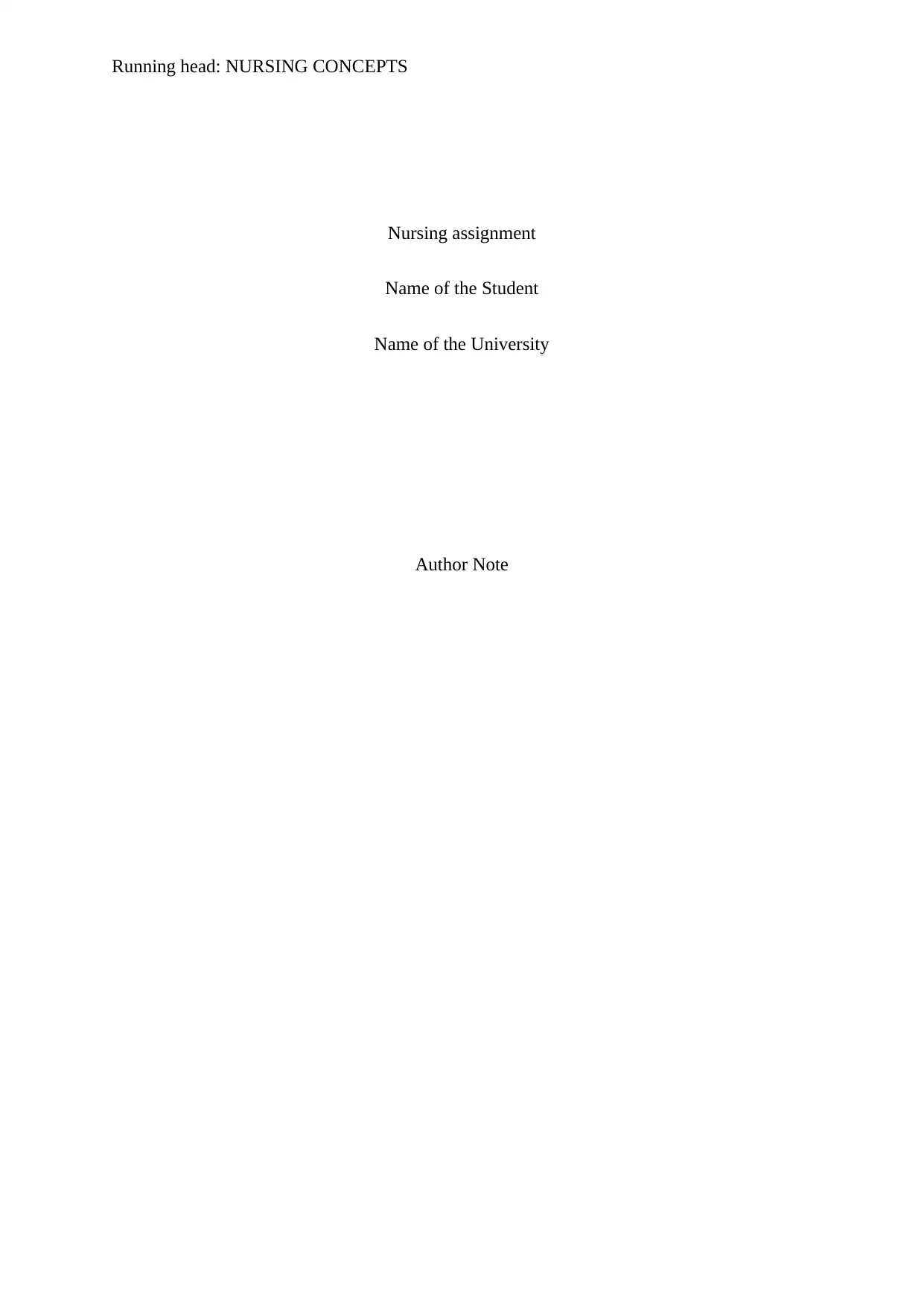
Running head: NURSING CONCEPTS
Nursing assignment
Name of the Student
Name of the University
Author Note
Nursing assignment
Name of the Student
Name of the University
Author Note
Paraphrase This Document
Need a fresh take? Get an instant paraphrase of this document with our AI Paraphraser
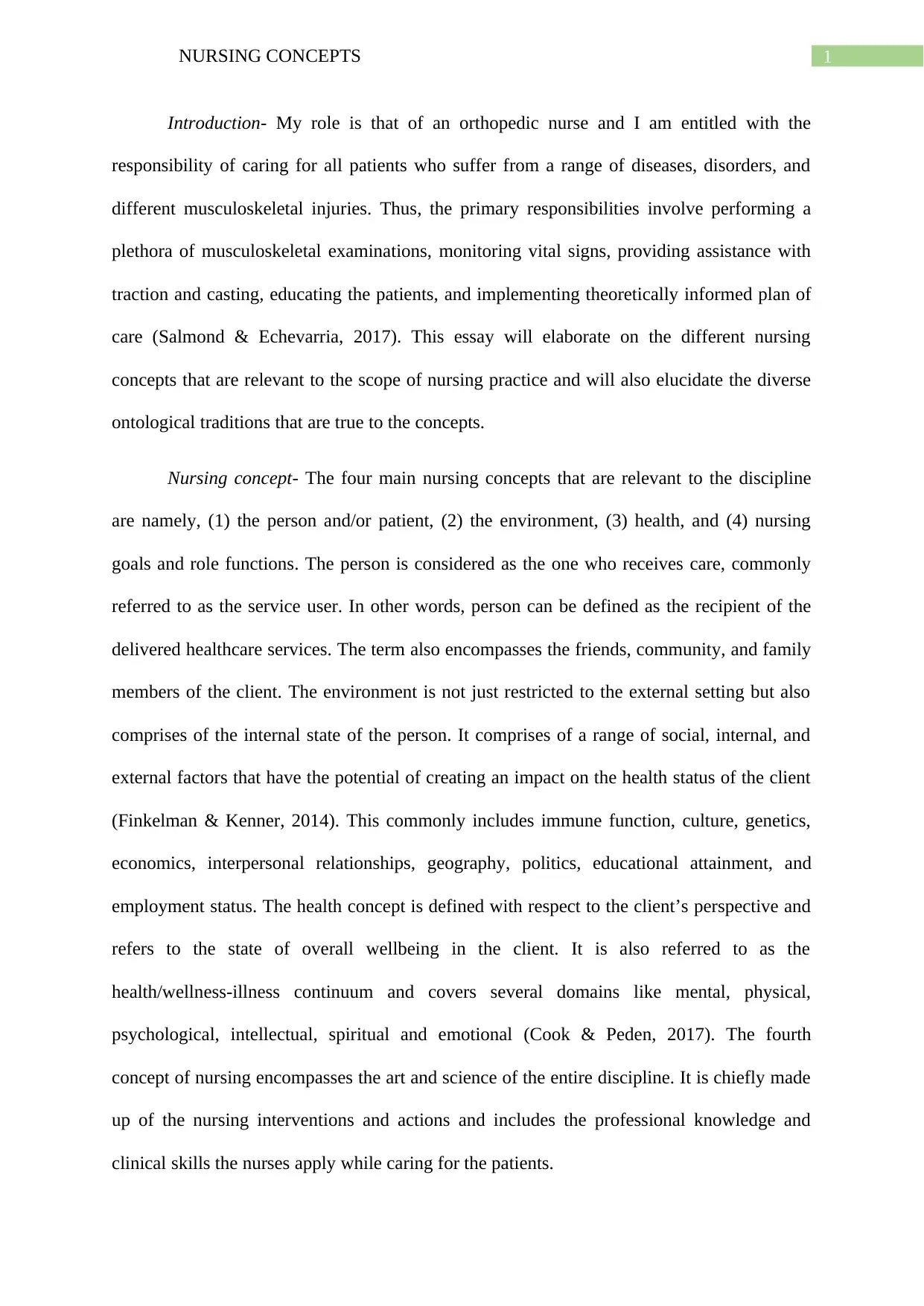
1NURSING CONCEPTS
Introduction- My role is that of an orthopedic nurse and I am entitled with the
responsibility of caring for all patients who suffer from a range of diseases, disorders, and
different musculoskeletal injuries. Thus, the primary responsibilities involve performing a
plethora of musculoskeletal examinations, monitoring vital signs, providing assistance with
traction and casting, educating the patients, and implementing theoretically informed plan of
care (Salmond & Echevarria, 2017). This essay will elaborate on the different nursing
concepts that are relevant to the scope of nursing practice and will also elucidate the diverse
ontological traditions that are true to the concepts.
Nursing concept- The four main nursing concepts that are relevant to the discipline
are namely, (1) the person and/or patient, (2) the environment, (3) health, and (4) nursing
goals and role functions. The person is considered as the one who receives care, commonly
referred to as the service user. In other words, person can be defined as the recipient of the
delivered healthcare services. The term also encompasses the friends, community, and family
members of the client. The environment is not just restricted to the external setting but also
comprises of the internal state of the person. It comprises of a range of social, internal, and
external factors that have the potential of creating an impact on the health status of the client
(Finkelman & Kenner, 2014). This commonly includes immune function, culture, genetics,
economics, interpersonal relationships, geography, politics, educational attainment, and
employment status. The health concept is defined with respect to the client’s perspective and
refers to the state of overall wellbeing in the client. It is also referred to as the
health/wellness-illness continuum and covers several domains like mental, physical,
psychological, intellectual, spiritual and emotional (Cook & Peden, 2017). The fourth
concept of nursing encompasses the art and science of the entire discipline. It is chiefly made
up of the nursing interventions and actions and includes the professional knowledge and
clinical skills the nurses apply while caring for the patients.
Introduction- My role is that of an orthopedic nurse and I am entitled with the
responsibility of caring for all patients who suffer from a range of diseases, disorders, and
different musculoskeletal injuries. Thus, the primary responsibilities involve performing a
plethora of musculoskeletal examinations, monitoring vital signs, providing assistance with
traction and casting, educating the patients, and implementing theoretically informed plan of
care (Salmond & Echevarria, 2017). This essay will elaborate on the different nursing
concepts that are relevant to the scope of nursing practice and will also elucidate the diverse
ontological traditions that are true to the concepts.
Nursing concept- The four main nursing concepts that are relevant to the discipline
are namely, (1) the person and/or patient, (2) the environment, (3) health, and (4) nursing
goals and role functions. The person is considered as the one who receives care, commonly
referred to as the service user. In other words, person can be defined as the recipient of the
delivered healthcare services. The term also encompasses the friends, community, and family
members of the client. The environment is not just restricted to the external setting but also
comprises of the internal state of the person. It comprises of a range of social, internal, and
external factors that have the potential of creating an impact on the health status of the client
(Finkelman & Kenner, 2014). This commonly includes immune function, culture, genetics,
economics, interpersonal relationships, geography, politics, educational attainment, and
employment status. The health concept is defined with respect to the client’s perspective and
refers to the state of overall wellbeing in the client. It is also referred to as the
health/wellness-illness continuum and covers several domains like mental, physical,
psychological, intellectual, spiritual and emotional (Cook & Peden, 2017). The fourth
concept of nursing encompasses the art and science of the entire discipline. It is chiefly made
up of the nursing interventions and actions and includes the professional knowledge and
clinical skills the nurses apply while caring for the patients.
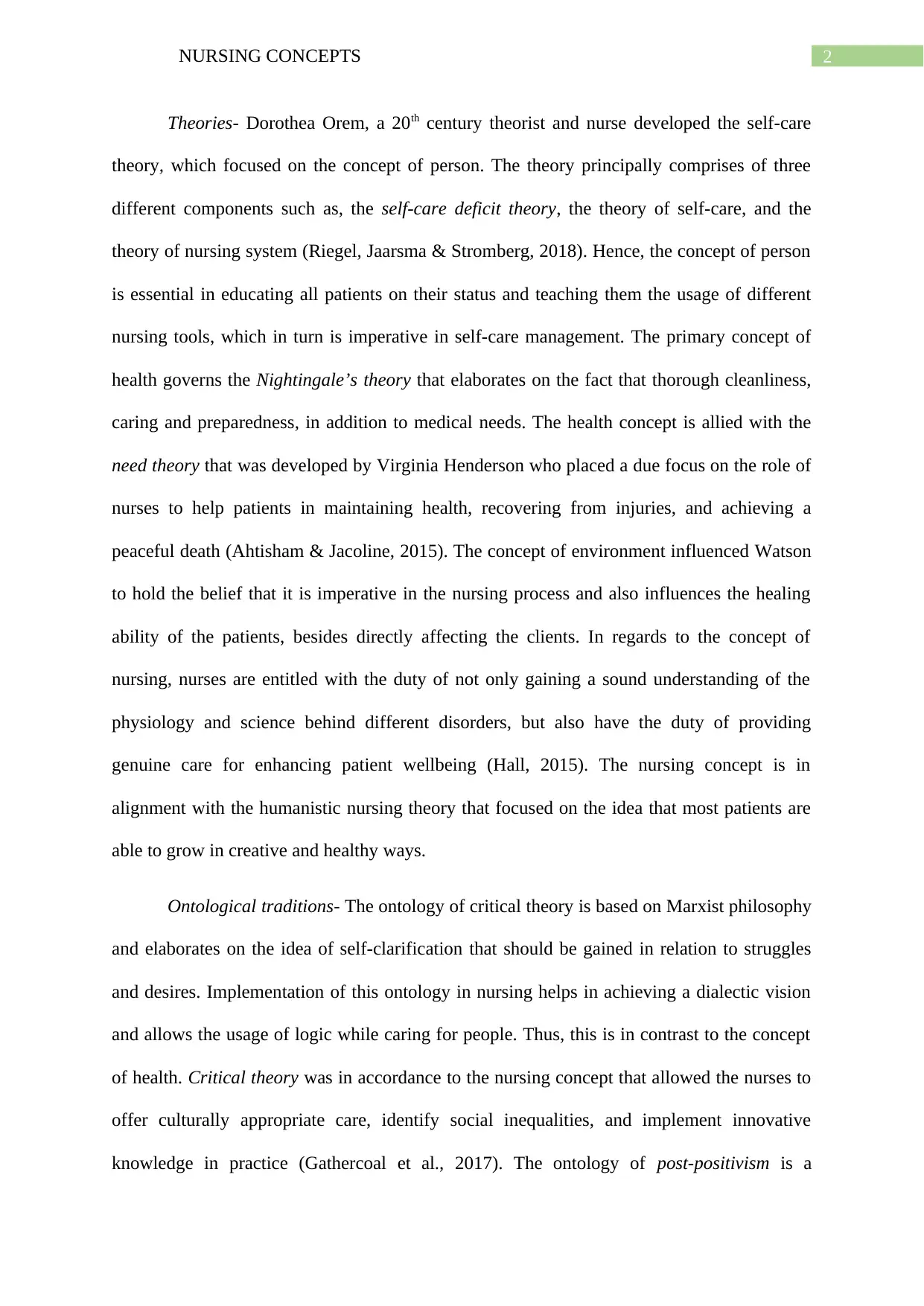
2NURSING CONCEPTS
Theories- Dorothea Orem, a 20th century theorist and nurse developed the self-care
theory, which focused on the concept of person. The theory principally comprises of three
different components such as, the self-care deficit theory, the theory of self-care, and the
theory of nursing system (Riegel, Jaarsma & Stromberg, 2018). Hence, the concept of person
is essential in educating all patients on their status and teaching them the usage of different
nursing tools, which in turn is imperative in self-care management. The primary concept of
health governs the Nightingale’s theory that elaborates on the fact that thorough cleanliness,
caring and preparedness, in addition to medical needs. The health concept is allied with the
need theory that was developed by Virginia Henderson who placed a due focus on the role of
nurses to help patients in maintaining health, recovering from injuries, and achieving a
peaceful death (Ahtisham & Jacoline, 2015). The concept of environment influenced Watson
to hold the belief that it is imperative in the nursing process and also influences the healing
ability of the patients, besides directly affecting the clients. In regards to the concept of
nursing, nurses are entitled with the duty of not only gaining a sound understanding of the
physiology and science behind different disorders, but also have the duty of providing
genuine care for enhancing patient wellbeing (Hall, 2015). The nursing concept is in
alignment with the humanistic nursing theory that focused on the idea that most patients are
able to grow in creative and healthy ways.
Ontological traditions- The ontology of critical theory is based on Marxist philosophy
and elaborates on the idea of self-clarification that should be gained in relation to struggles
and desires. Implementation of this ontology in nursing helps in achieving a dialectic vision
and allows the usage of logic while caring for people. Thus, this is in contrast to the concept
of health. Critical theory was in accordance to the nursing concept that allowed the nurses to
offer culturally appropriate care, identify social inequalities, and implement innovative
knowledge in practice (Gathercoal et al., 2017). The ontology of post-positivism is a
Theories- Dorothea Orem, a 20th century theorist and nurse developed the self-care
theory, which focused on the concept of person. The theory principally comprises of three
different components such as, the self-care deficit theory, the theory of self-care, and the
theory of nursing system (Riegel, Jaarsma & Stromberg, 2018). Hence, the concept of person
is essential in educating all patients on their status and teaching them the usage of different
nursing tools, which in turn is imperative in self-care management. The primary concept of
health governs the Nightingale’s theory that elaborates on the fact that thorough cleanliness,
caring and preparedness, in addition to medical needs. The health concept is allied with the
need theory that was developed by Virginia Henderson who placed a due focus on the role of
nurses to help patients in maintaining health, recovering from injuries, and achieving a
peaceful death (Ahtisham & Jacoline, 2015). The concept of environment influenced Watson
to hold the belief that it is imperative in the nursing process and also influences the healing
ability of the patients, besides directly affecting the clients. In regards to the concept of
nursing, nurses are entitled with the duty of not only gaining a sound understanding of the
physiology and science behind different disorders, but also have the duty of providing
genuine care for enhancing patient wellbeing (Hall, 2015). The nursing concept is in
alignment with the humanistic nursing theory that focused on the idea that most patients are
able to grow in creative and healthy ways.
Ontological traditions- The ontology of critical theory is based on Marxist philosophy
and elaborates on the idea of self-clarification that should be gained in relation to struggles
and desires. Implementation of this ontology in nursing helps in achieving a dialectic vision
and allows the usage of logic while caring for people. Thus, this is in contrast to the concept
of health. Critical theory was in accordance to the nursing concept that allowed the nurses to
offer culturally appropriate care, identify social inequalities, and implement innovative
knowledge in practice (Gathercoal et al., 2017). The ontology of post-positivism is a
⊘ This is a preview!⊘
Do you want full access?
Subscribe today to unlock all pages.

Trusted by 1+ million students worldwide
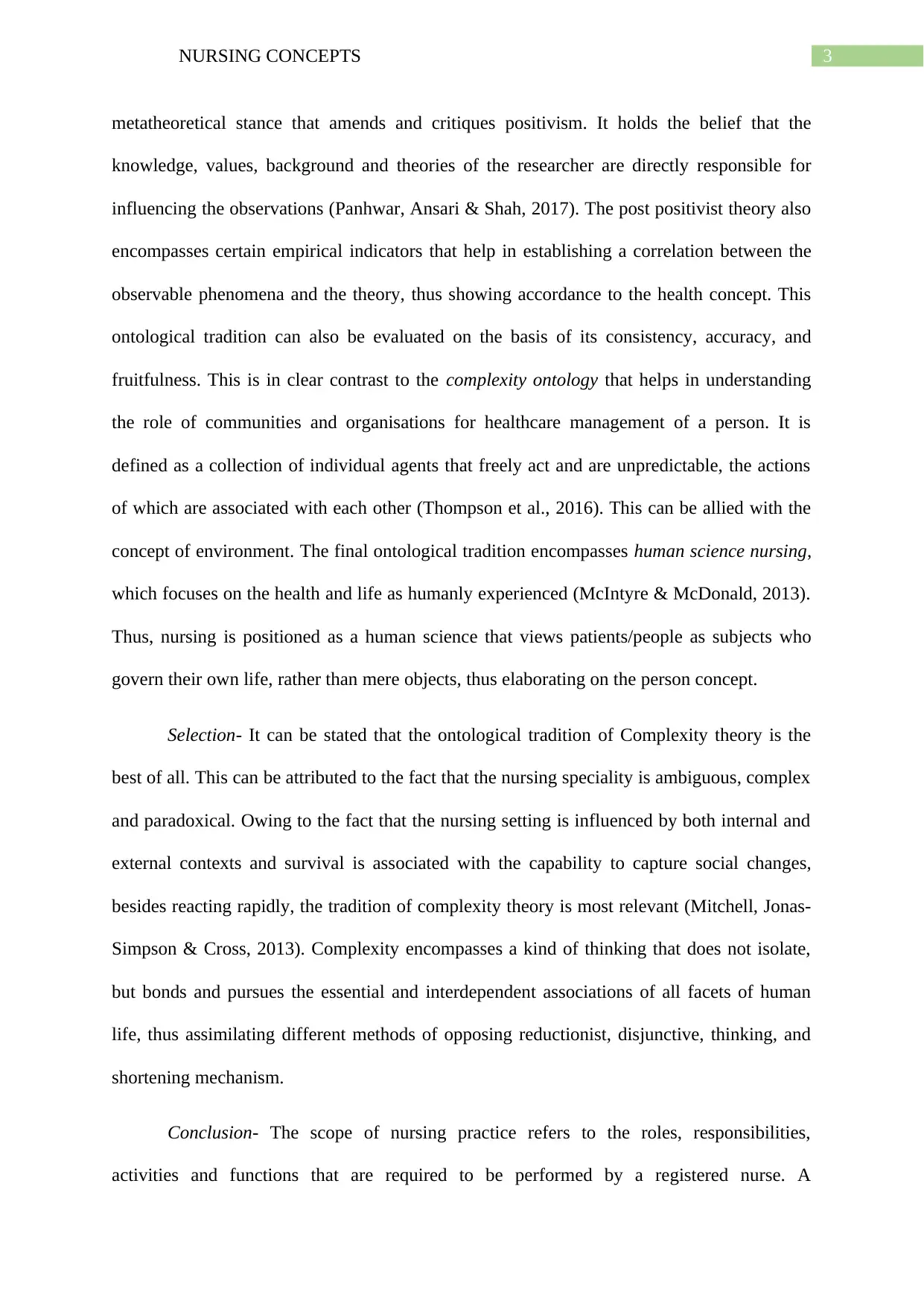
3NURSING CONCEPTS
metatheoretical stance that amends and critiques positivism. It holds the belief that the
knowledge, values, background and theories of the researcher are directly responsible for
influencing the observations (Panhwar, Ansari & Shah, 2017). The post positivist theory also
encompasses certain empirical indicators that help in establishing a correlation between the
observable phenomena and the theory, thus showing accordance to the health concept. This
ontological tradition can also be evaluated on the basis of its consistency, accuracy, and
fruitfulness. This is in clear contrast to the complexity ontology that helps in understanding
the role of communities and organisations for healthcare management of a person. It is
defined as a collection of individual agents that freely act and are unpredictable, the actions
of which are associated with each other (Thompson et al., 2016). This can be allied with the
concept of environment. The final ontological tradition encompasses human science nursing,
which focuses on the health and life as humanly experienced (McIntyre & McDonald, 2013).
Thus, nursing is positioned as a human science that views patients/people as subjects who
govern their own life, rather than mere objects, thus elaborating on the person concept.
Selection- It can be stated that the ontological tradition of Complexity theory is the
best of all. This can be attributed to the fact that the nursing speciality is ambiguous, complex
and paradoxical. Owing to the fact that the nursing setting is influenced by both internal and
external contexts and survival is associated with the capability to capture social changes,
besides reacting rapidly, the tradition of complexity theory is most relevant (Mitchell, Jonas-
Simpson & Cross, 2013). Complexity encompasses a kind of thinking that does not isolate,
but bonds and pursues the essential and interdependent associations of all facets of human
life, thus assimilating different methods of opposing reductionist, disjunctive, thinking, and
shortening mechanism.
Conclusion- The scope of nursing practice refers to the roles, responsibilities,
activities and functions that are required to be performed by a registered nurse. A
metatheoretical stance that amends and critiques positivism. It holds the belief that the
knowledge, values, background and theories of the researcher are directly responsible for
influencing the observations (Panhwar, Ansari & Shah, 2017). The post positivist theory also
encompasses certain empirical indicators that help in establishing a correlation between the
observable phenomena and the theory, thus showing accordance to the health concept. This
ontological tradition can also be evaluated on the basis of its consistency, accuracy, and
fruitfulness. This is in clear contrast to the complexity ontology that helps in understanding
the role of communities and organisations for healthcare management of a person. It is
defined as a collection of individual agents that freely act and are unpredictable, the actions
of which are associated with each other (Thompson et al., 2016). This can be allied with the
concept of environment. The final ontological tradition encompasses human science nursing,
which focuses on the health and life as humanly experienced (McIntyre & McDonald, 2013).
Thus, nursing is positioned as a human science that views patients/people as subjects who
govern their own life, rather than mere objects, thus elaborating on the person concept.
Selection- It can be stated that the ontological tradition of Complexity theory is the
best of all. This can be attributed to the fact that the nursing speciality is ambiguous, complex
and paradoxical. Owing to the fact that the nursing setting is influenced by both internal and
external contexts and survival is associated with the capability to capture social changes,
besides reacting rapidly, the tradition of complexity theory is most relevant (Mitchell, Jonas-
Simpson & Cross, 2013). Complexity encompasses a kind of thinking that does not isolate,
but bonds and pursues the essential and interdependent associations of all facets of human
life, thus assimilating different methods of opposing reductionist, disjunctive, thinking, and
shortening mechanism.
Conclusion- The scope of nursing practice refers to the roles, responsibilities,
activities and functions that are required to be performed by a registered nurse. A
Paraphrase This Document
Need a fresh take? Get an instant paraphrase of this document with our AI Paraphraser
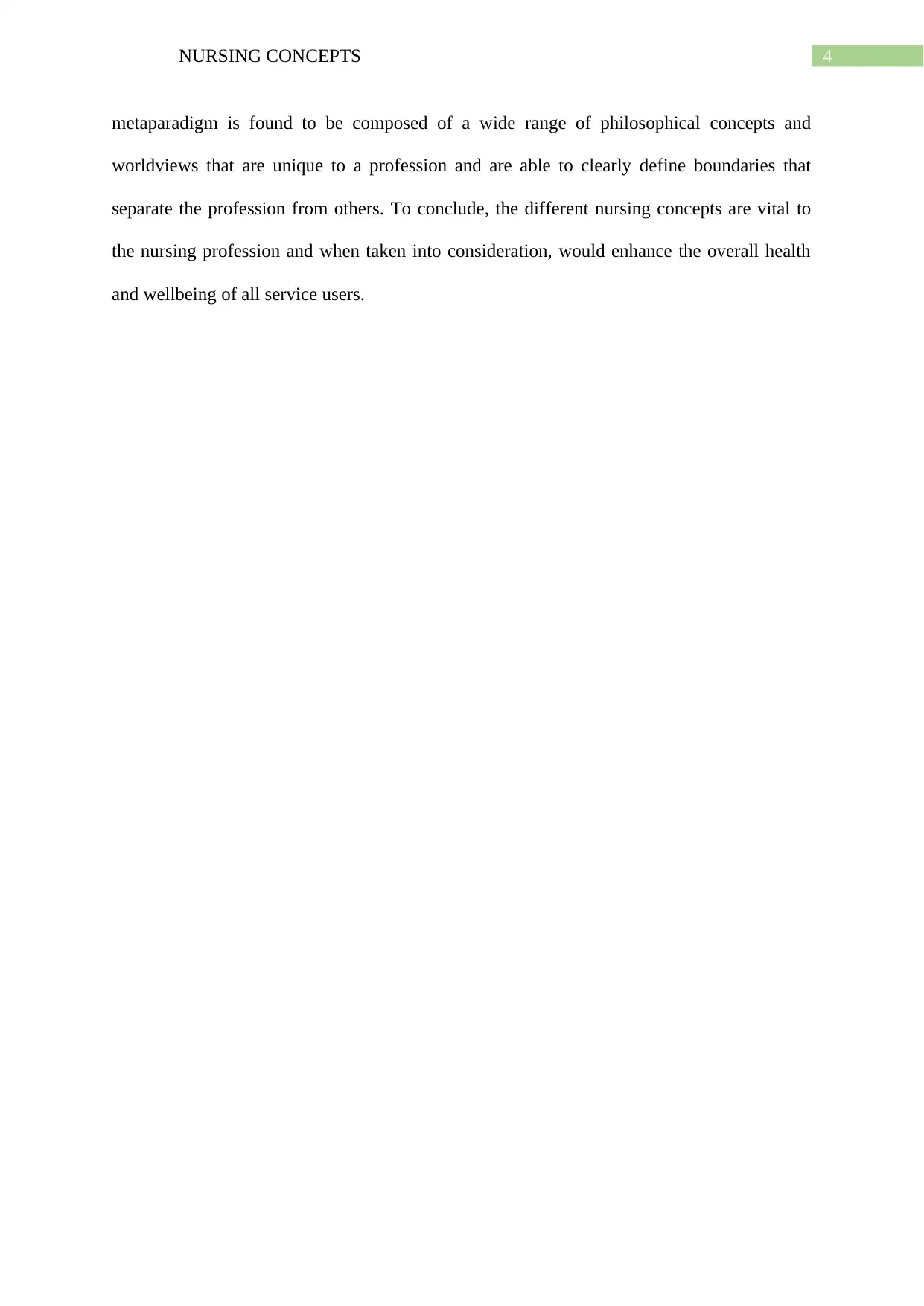
4NURSING CONCEPTS
metaparadigm is found to be composed of a wide range of philosophical concepts and
worldviews that are unique to a profession and are able to clearly define boundaries that
separate the profession from others. To conclude, the different nursing concepts are vital to
the nursing profession and when taken into consideration, would enhance the overall health
and wellbeing of all service users.
metaparadigm is found to be composed of a wide range of philosophical concepts and
worldviews that are unique to a profession and are able to clearly define boundaries that
separate the profession from others. To conclude, the different nursing concepts are vital to
the nursing profession and when taken into consideration, would enhance the overall health
and wellbeing of all service users.
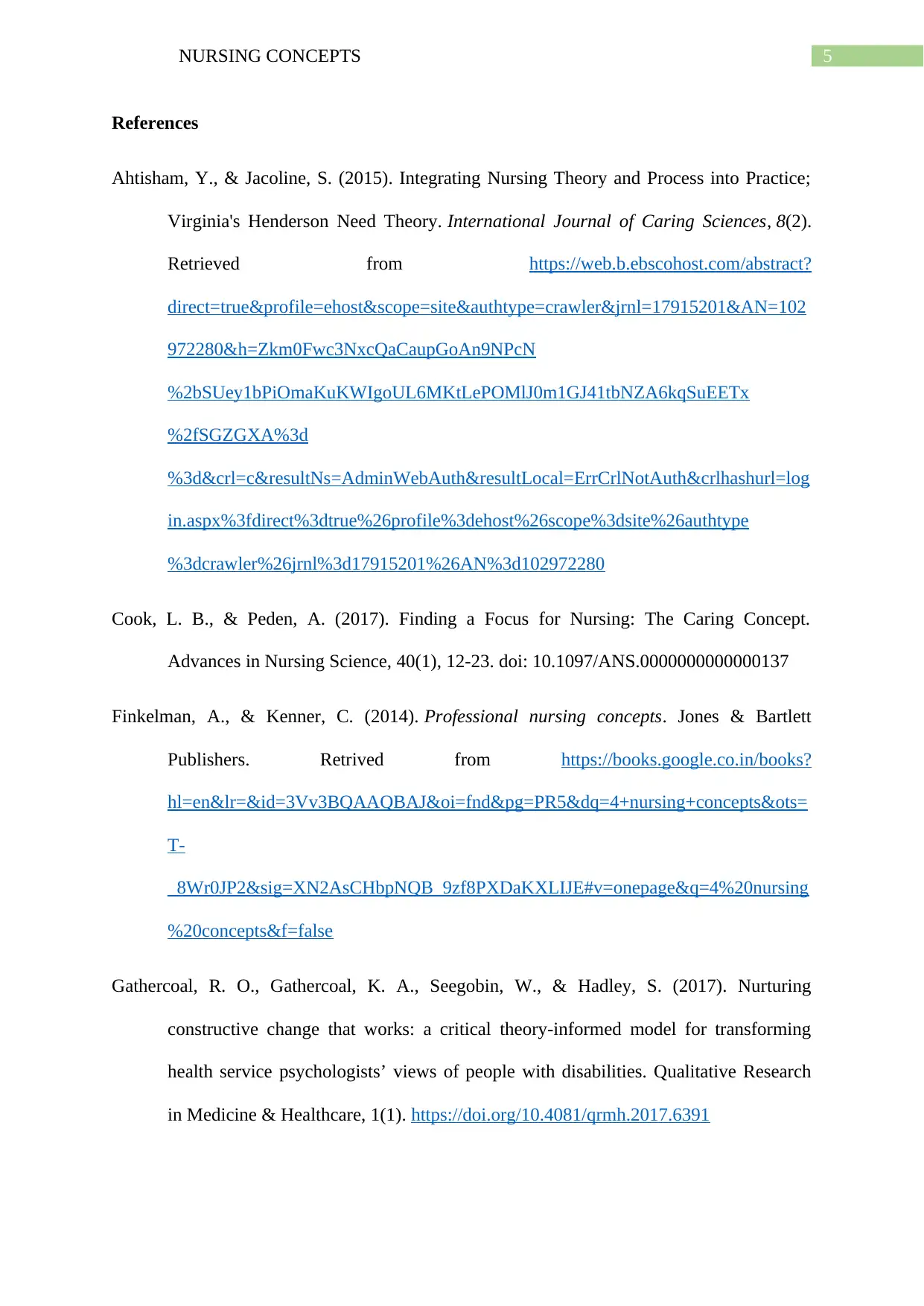
5NURSING CONCEPTS
References
Ahtisham, Y., & Jacoline, S. (2015). Integrating Nursing Theory and Process into Practice;
Virginia's Henderson Need Theory. International Journal of Caring Sciences, 8(2).
Retrieved from https://web.b.ebscohost.com/abstract?
direct=true&profile=ehost&scope=site&authtype=crawler&jrnl=17915201&AN=102
972280&h=Zkm0Fwc3NxcQaCaupGoAn9NPcN
%2bSUey1bPiOmaKuKWIgoUL6MKtLePOMlJ0m1GJ41tbNZA6kqSuEETx
%2fSGZGXA%3d
%3d&crl=c&resultNs=AdminWebAuth&resultLocal=ErrCrlNotAuth&crlhashurl=log
in.aspx%3fdirect%3dtrue%26profile%3dehost%26scope%3dsite%26authtype
%3dcrawler%26jrnl%3d17915201%26AN%3d102972280
Cook, L. B., & Peden, A. (2017). Finding a Focus for Nursing: The Caring Concept.
Advances in Nursing Science, 40(1), 12-23. doi: 10.1097/ANS.0000000000000137
Finkelman, A., & Kenner, C. (2014). Professional nursing concepts. Jones & Bartlett
Publishers. Retrived from https://books.google.co.in/books?
hl=en&lr=&id=3Vv3BQAAQBAJ&oi=fnd&pg=PR5&dq=4+nursing+concepts&ots=
T-
_8Wr0JP2&sig=XN2AsCHbpNQB_9zf8PXDaKXLIJE#v=onepage&q=4%20nursing
%20concepts&f=false
Gathercoal, R. O., Gathercoal, K. A., Seegobin, W., & Hadley, S. (2017). Nurturing
constructive change that works: a critical theory-informed model for transforming
health service psychologists’ views of people with disabilities. Qualitative Research
in Medicine & Healthcare, 1(1). https://doi.org/10.4081/qrmh.2017.6391
References
Ahtisham, Y., & Jacoline, S. (2015). Integrating Nursing Theory and Process into Practice;
Virginia's Henderson Need Theory. International Journal of Caring Sciences, 8(2).
Retrieved from https://web.b.ebscohost.com/abstract?
direct=true&profile=ehost&scope=site&authtype=crawler&jrnl=17915201&AN=102
972280&h=Zkm0Fwc3NxcQaCaupGoAn9NPcN
%2bSUey1bPiOmaKuKWIgoUL6MKtLePOMlJ0m1GJ41tbNZA6kqSuEETx
%2fSGZGXA%3d
%3d&crl=c&resultNs=AdminWebAuth&resultLocal=ErrCrlNotAuth&crlhashurl=log
in.aspx%3fdirect%3dtrue%26profile%3dehost%26scope%3dsite%26authtype
%3dcrawler%26jrnl%3d17915201%26AN%3d102972280
Cook, L. B., & Peden, A. (2017). Finding a Focus for Nursing: The Caring Concept.
Advances in Nursing Science, 40(1), 12-23. doi: 10.1097/ANS.0000000000000137
Finkelman, A., & Kenner, C. (2014). Professional nursing concepts. Jones & Bartlett
Publishers. Retrived from https://books.google.co.in/books?
hl=en&lr=&id=3Vv3BQAAQBAJ&oi=fnd&pg=PR5&dq=4+nursing+concepts&ots=
T-
_8Wr0JP2&sig=XN2AsCHbpNQB_9zf8PXDaKXLIJE#v=onepage&q=4%20nursing
%20concepts&f=false
Gathercoal, R. O., Gathercoal, K. A., Seegobin, W., & Hadley, S. (2017). Nurturing
constructive change that works: a critical theory-informed model for transforming
health service psychologists’ views of people with disabilities. Qualitative Research
in Medicine & Healthcare, 1(1). https://doi.org/10.4081/qrmh.2017.6391
⊘ This is a preview!⊘
Do you want full access?
Subscribe today to unlock all pages.

Trusted by 1+ million students worldwide
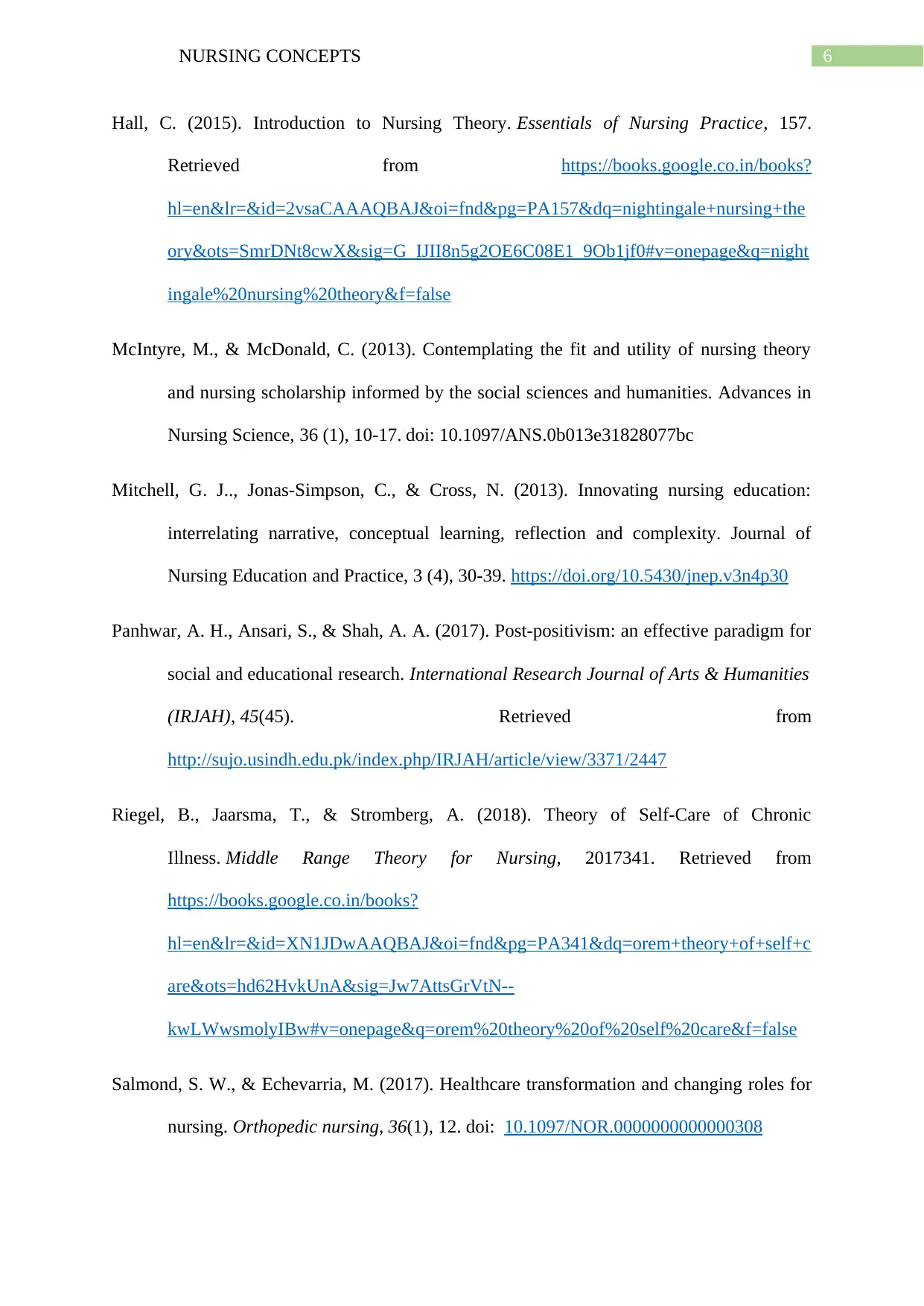
6NURSING CONCEPTS
Hall, C. (2015). Introduction to Nursing Theory. Essentials of Nursing Practice, 157.
Retrieved from https://books.google.co.in/books?
hl=en&lr=&id=2vsaCAAAQBAJ&oi=fnd&pg=PA157&dq=nightingale+nursing+the
ory&ots=SmrDNt8cwX&sig=G_IJII8n5g2OE6C08E1_9Ob1jf0#v=onepage&q=night
ingale%20nursing%20theory&f=false
McIntyre, M., & McDonald, C. (2013). Contemplating the fit and utility of nursing theory
and nursing scholarship informed by the social sciences and humanities. Advances in
Nursing Science, 36 (1), 10-17. doi: 10.1097/ANS.0b013e31828077bc
Mitchell, G. J.., Jonas-Simpson, C., & Cross, N. (2013). Innovating nursing education:
interrelating narrative, conceptual learning, reflection and complexity. Journal of
Nursing Education and Practice, 3 (4), 30-39. https://doi.org/10.5430/jnep.v3n4p30
Panhwar, A. H., Ansari, S., & Shah, A. A. (2017). Post-positivism: an effective paradigm for
social and educational research. International Research Journal of Arts & Humanities
(IRJAH), 45(45). Retrieved from
http://sujo.usindh.edu.pk/index.php/IRJAH/article/view/3371/2447
Riegel, B., Jaarsma, T., & Stromberg, A. (2018). Theory of Self-Care of Chronic
Illness. Middle Range Theory for Nursing, 2017341. Retrieved from
https://books.google.co.in/books?
hl=en&lr=&id=XN1JDwAAQBAJ&oi=fnd&pg=PA341&dq=orem+theory+of+self+c
are&ots=hd62HvkUnA&sig=Jw7AttsGrVtN--
kwLWwsmolyIBw#v=onepage&q=orem%20theory%20of%20self%20care&f=false
Salmond, S. W., & Echevarria, M. (2017). Healthcare transformation and changing roles for
nursing. Orthopedic nursing, 36(1), 12. doi: 10.1097/NOR.0000000000000308
Hall, C. (2015). Introduction to Nursing Theory. Essentials of Nursing Practice, 157.
Retrieved from https://books.google.co.in/books?
hl=en&lr=&id=2vsaCAAAQBAJ&oi=fnd&pg=PA157&dq=nightingale+nursing+the
ory&ots=SmrDNt8cwX&sig=G_IJII8n5g2OE6C08E1_9Ob1jf0#v=onepage&q=night
ingale%20nursing%20theory&f=false
McIntyre, M., & McDonald, C. (2013). Contemplating the fit and utility of nursing theory
and nursing scholarship informed by the social sciences and humanities. Advances in
Nursing Science, 36 (1), 10-17. doi: 10.1097/ANS.0b013e31828077bc
Mitchell, G. J.., Jonas-Simpson, C., & Cross, N. (2013). Innovating nursing education:
interrelating narrative, conceptual learning, reflection and complexity. Journal of
Nursing Education and Practice, 3 (4), 30-39. https://doi.org/10.5430/jnep.v3n4p30
Panhwar, A. H., Ansari, S., & Shah, A. A. (2017). Post-positivism: an effective paradigm for
social and educational research. International Research Journal of Arts & Humanities
(IRJAH), 45(45). Retrieved from
http://sujo.usindh.edu.pk/index.php/IRJAH/article/view/3371/2447
Riegel, B., Jaarsma, T., & Stromberg, A. (2018). Theory of Self-Care of Chronic
Illness. Middle Range Theory for Nursing, 2017341. Retrieved from
https://books.google.co.in/books?
hl=en&lr=&id=XN1JDwAAQBAJ&oi=fnd&pg=PA341&dq=orem+theory+of+self+c
are&ots=hd62HvkUnA&sig=Jw7AttsGrVtN--
kwLWwsmolyIBw#v=onepage&q=orem%20theory%20of%20self%20care&f=false
Salmond, S. W., & Echevarria, M. (2017). Healthcare transformation and changing roles for
nursing. Orthopedic nursing, 36(1), 12. doi: 10.1097/NOR.0000000000000308
Paraphrase This Document
Need a fresh take? Get an instant paraphrase of this document with our AI Paraphraser
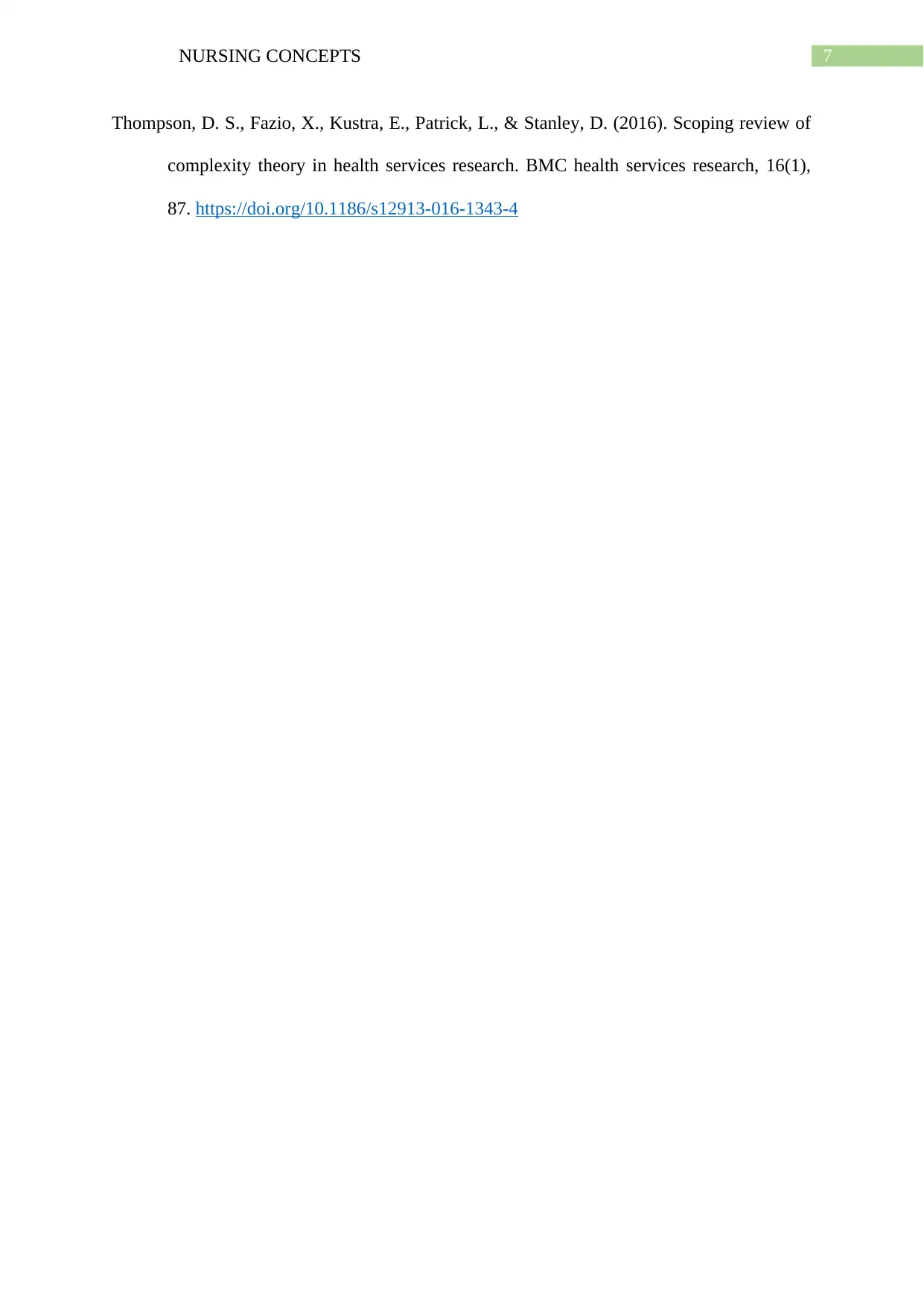
7NURSING CONCEPTS
Thompson, D. S., Fazio, X., Kustra, E., Patrick, L., & Stanley, D. (2016). Scoping review of
complexity theory in health services research. BMC health services research, 16(1),
87. https://doi.org/10.1186/s12913-016-1343-4
Thompson, D. S., Fazio, X., Kustra, E., Patrick, L., & Stanley, D. (2016). Scoping review of
complexity theory in health services research. BMC health services research, 16(1),
87. https://doi.org/10.1186/s12913-016-1343-4
1 out of 8
Related Documents
Your All-in-One AI-Powered Toolkit for Academic Success.
+13062052269
info@desklib.com
Available 24*7 on WhatsApp / Email
![[object Object]](/_next/static/media/star-bottom.7253800d.svg)
Unlock your academic potential
Copyright © 2020–2026 A2Z Services. All Rights Reserved. Developed and managed by ZUCOL.




